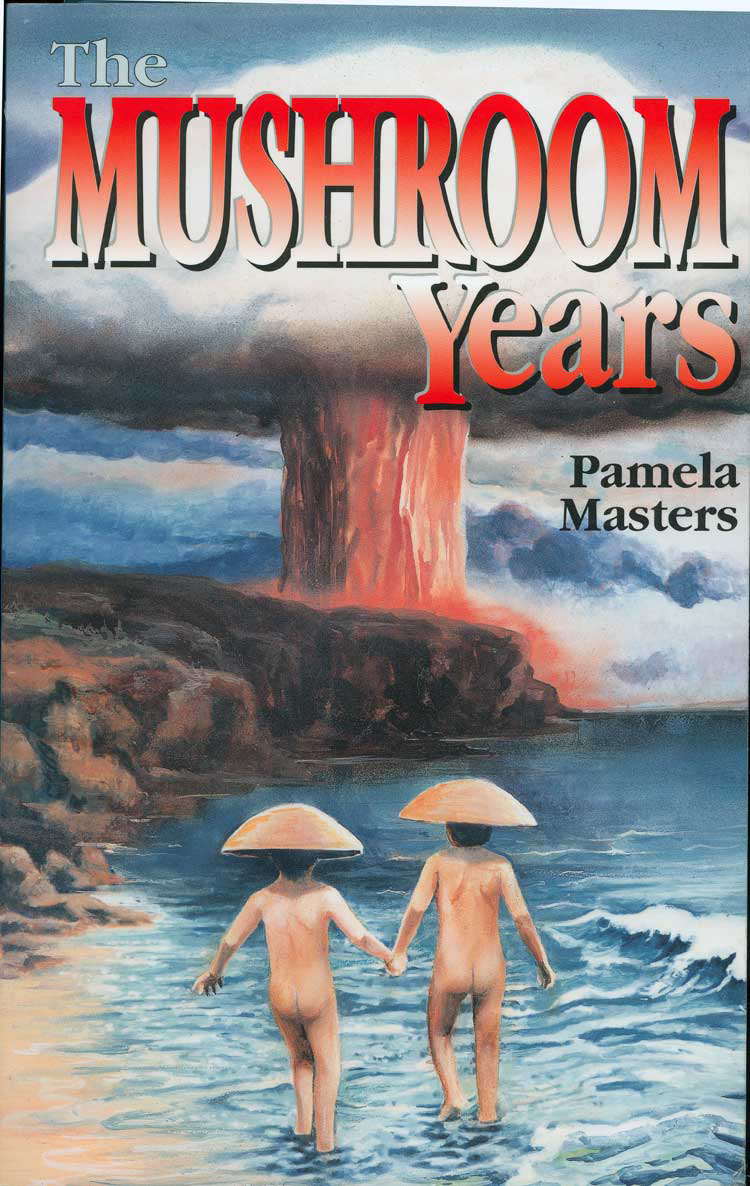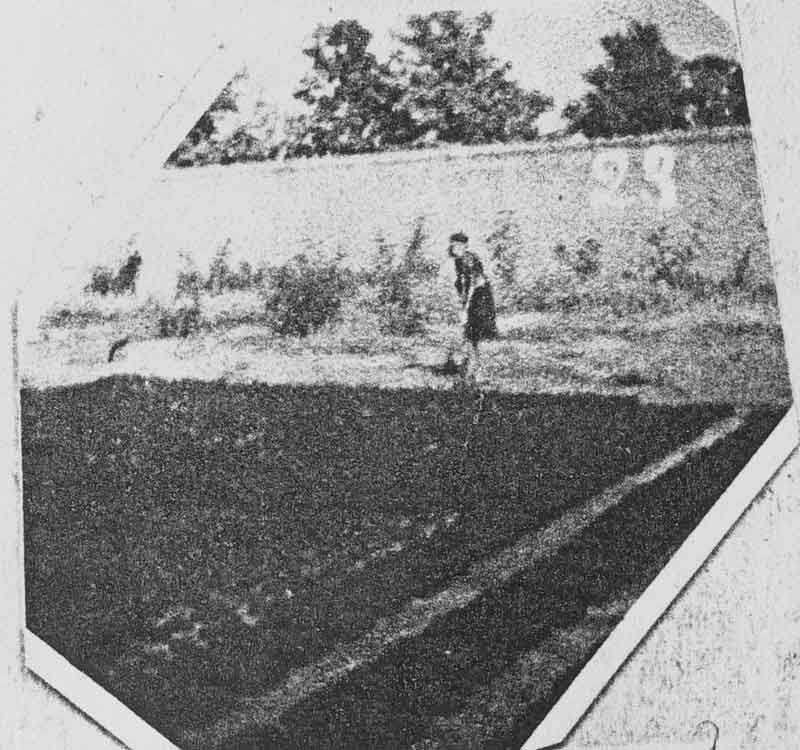
- by Pamela Masters, née Simmons
[Excerpts] ...
[...]
 There was no fuel!
There was no fuel!
It wasn’t until several weeks later that a load of coal came in for us, and when we went to get our ration, we found it wasn’t coal, but coal-dust. Recalling the lovely big chunks of coal we used to get from the Kailan, I asked in disgust, “What the heck are we supposed to do with this?”
“Make coal balls,” I was told. “How?”
“You mix the coal-dust with mud, and compact it well, and it should burn very nicely.”
“How much?” I asked. “How much what?”
“How much mud and how much coal-dust?” “You’ll have to experiment.”
“Thanks a heap!”
“Don’t be sarcastic, Bobby, he’s trying to help,” Ursula said, as she helped carry the bucket of coal- dust back to the cell.
“Well,” I said slowly, “If we mix one bucket of dust with one bucket of mud, we might get two buckets of coal balls. That should last us a day, then what do we do?”
“It’s obvious we can’t light a fire till evening, and then only if we are really freezing, as they’re not going to give us a ration of coal-dust on a daily basis. Maybe not even weekly.”
We soon found out Ursula was right. We also found out how to make coal balls, and after a while, we learned there were different types of soil in different parts of the camp that bound better, and burned longer, and we kept these little caches of special clay a secret from the others.
I’ll never forget the day we made our first batch of coal balls.
We got filthy, and our hands turned numb as we had to make them outdoors. Then, when they were done, we found we still couldn’t burn them as they were wet through.
“Lord, how long will it take these darn things to dry out?” Margo asked.
“The Adams got their coal-dust a week ago, because their name starts with an `A’,” Ursula said, “And they told me their coal balls are only now dried through.”
“You mean, after all this, we’ve got to wait another week before we can have a fire?” I wailed.
“Just think how wonderful spring’s going to be when it comes around,” Margo said facetiously.
#
[excerpts]
It was a good two weeks later, after a gloriously wicked evening of warmth and happy-talk, almost like old times, that I fell asleep to be woken later by the sound of soft crackling. I immediately thought the banked fire had started up again, so I furtively put my hand near the stove. No heat. I touched it. It was cold, but I could still hear the crackling.
I reached for some matches, and lighting the oil wick, carefully peered around the room. Then I saw it, not two inches from Ursula’s face—a horrible scorpion, poised to strike!
It was the first scorpion I had seen in our cell, although I’d heard some had been found in the camp. This one had come out of the cracked plaster on the walls to enjoy the warmth of the fire, and when the fire had gone out, it had decided to get some more heat from a human body—Ursula’s.
I didn’t dare make a sound, in case she woke up and moved. I fumbled quietly trying to find a scrap of paper in the dimly lit room, so I could pick up the creature and kill it.
“What’s up?” Margo whispered. “Sssh! Scorpion!” I said softly.
Finally, finding some Japanese newsprint that we’d used to start the fire, I crept over to Ursula’s bed and carefully grabbed the menacing creature; then dropping it on the floor, I proceeded to pound the life out of it with my shoe.
“Hey! What’s going on!?” Ursula yelled, sitting bolt-upright in bed.
“You had a visitor. A scorpion. I killed him.” “Oh, my God!”
None of us slept the rest of the night, as we were
too scared the scorpion’s mate would come to avenge its death.
#
[excerpts]
Not long after their arrival, the weather turned bitter, and the long, cold evenings started to get to us. None of us could afford to fire up a stove; we found ourselves keeping our little stashes of coal- balls for emergencies, or a possible illness requiring heat for recovery. Even when we huddled in each others’ cells, the cold dampened our mood and stunted conversation. The only night we all looked forward to was Saturday, where the dances in old K-2 really warmed us up. It didn’t matter that the place stank of rancid stew, or pungent leeks; it was warm, and that’s all we cared about.
#
[excerpts]
The monsoon rains were late that year. As soon as they had come and gone, cold seeped into the camp and chilled the soggy ground and buildings.
We hardly had an autumn before winter grabbed hold. The days weren’t bad, especially when the sun shone, but the nights were miserable. No matter how we tried, we couldn’t seal up our cells to keep them warm, let alone livable. There was no doubt we would have to have stoves if we were to survive the bone-chilling nights, but the Japs were in no hurry to oblige.
As it was, I spent most evenings in bed, bundled up in my clothes—including my fur coat—doing homework. When the breaker was pulled at ten o’clock and all the lights in camp went out, I would light a little wick floating in my precious ration of peanut oil, and keep on studying while my teeth chattered and my numb fingers could barely write. Ursula was no better off, and I would listen to her sniff as she quietly worked on her assignments.
When I finally snuffed out the wick and settled down for the night, I’d pull my covers over my head and breath deeply down into the bed, trying to trap the last ounce of body heat before suffocation set in. It wasn’t until early November that a carload of … stoves arrived. They were heavy monsters, and the three of us went down to the canteen to pick up the two for our cells.
Even disassembled, it took us a couple of trips. After setting up one in Mother and Dad’s cell, we placed ours between the beds at the back of our cell, with the stove pipe angled out through a pane of the clerestory window. A tin plate with a snug-fitting hole for the pipe had been provided to replace the glass pane, and with a lot of cussing and kidding, we ultimately installed the darn thing.
Dumbly, we thought with the arrival of the stoves our troubles would be over, but they weren’t.
There was no fuel!

… Then, in the biting cold, with frost cracked fingers, we shaped coal balls out of coal dust and clay. Grown-ups swapped coal ball recipes. Winter sunshine baked the coal balls dry enough for burning.
#
[further reading]

http://www.weihsien-paintings.org/books/MushroomYears/p_FrontCover.htm
#








